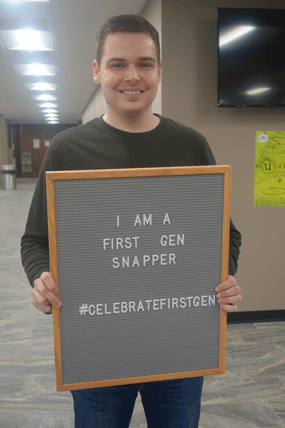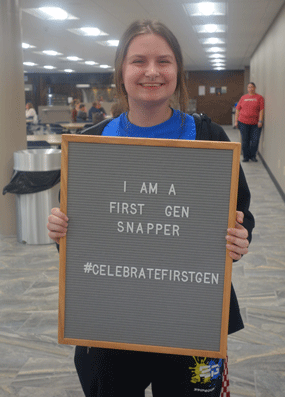Spoon River College celebrated National First-Generation Day on November 8, the date when the Higher Education Act of 1965 was signed by President Lyndon Johnson, providing federal funding with a goal of strengthening resources and making college more accessible to all students.
It is estimated that 55% of college students identify as first-generation, meaning that their parents did not complete a four-year college or university degree.
Jill Olson, director of the TRIO Student Support Services program at the college, said that can have a significant impact on a student’s chance of success. “First-generation students are less likely to be familiar with college processes, like the FAFSA and how to get financial aid in place. It can be overwhelming.”
The grant-funded TRIO program, which the college has had in place since 2010, was designed to help students overcome social, academic, class, and cultural barriers in higher education. Being a first-generation student is one of the eligibility requirements of being in the program.
“TRIO helps students navigate these systems and processes. Helping them overcome as many of these barriers as possible increases their chances of successfully completing a college degree or a certificate program and transferring onto the four-year college or university,” said Olson.
TRIO participants at Spoon River College are provided with personalized advising for career, transfer, and degree planning. Workshops covering topics ranging from personal financial literacy to time management and study tips are offered, and professional math and science tutors as well as peer tutors are available for both one-on-one and group study opportunities.
TRIO advisors place an emphasis on preparing students to transfer, aiding in selection of the correct transfer classes to take and traveling with students to visit four-year universities. Eligible transfer students who are TRIO members can have their application fees to their four-year schools waived. Cultural outings, including to museums and art exhibits (at no expense to students), are part of the program, and members regularly participate in community service projects.
“Our off-campus trips enable the TRIO students to connect socially with other students, while exposing them to experiences they may have never taken part in on their own,” said Olson.
TRIO participants are also eligible for an exclusive scholarship program and have access to a private computer lab and study space, free printing, and are able to borrow textbooks, graphing calculators and voice recorders. In 2020, the program introduced a laptop lending program that has been highly utilized by students.
“TRIO works with each student where they are at,” Olson said. “If the student wishes to use all our services, we are happy to cater to that. If they only need transfer assistance, we can provide that for the student. Each student’s academic journey and needs are different, and we work to meet each student’s individual needs while they are at SRC.”
“Our goal is to improve the academic success of our students so they can successfully graduate and transfer to a four-year university.”
To mark the occasion, first-generation students and employees were recognized, and cake was served to all at the Canton and Macomb campuses.


